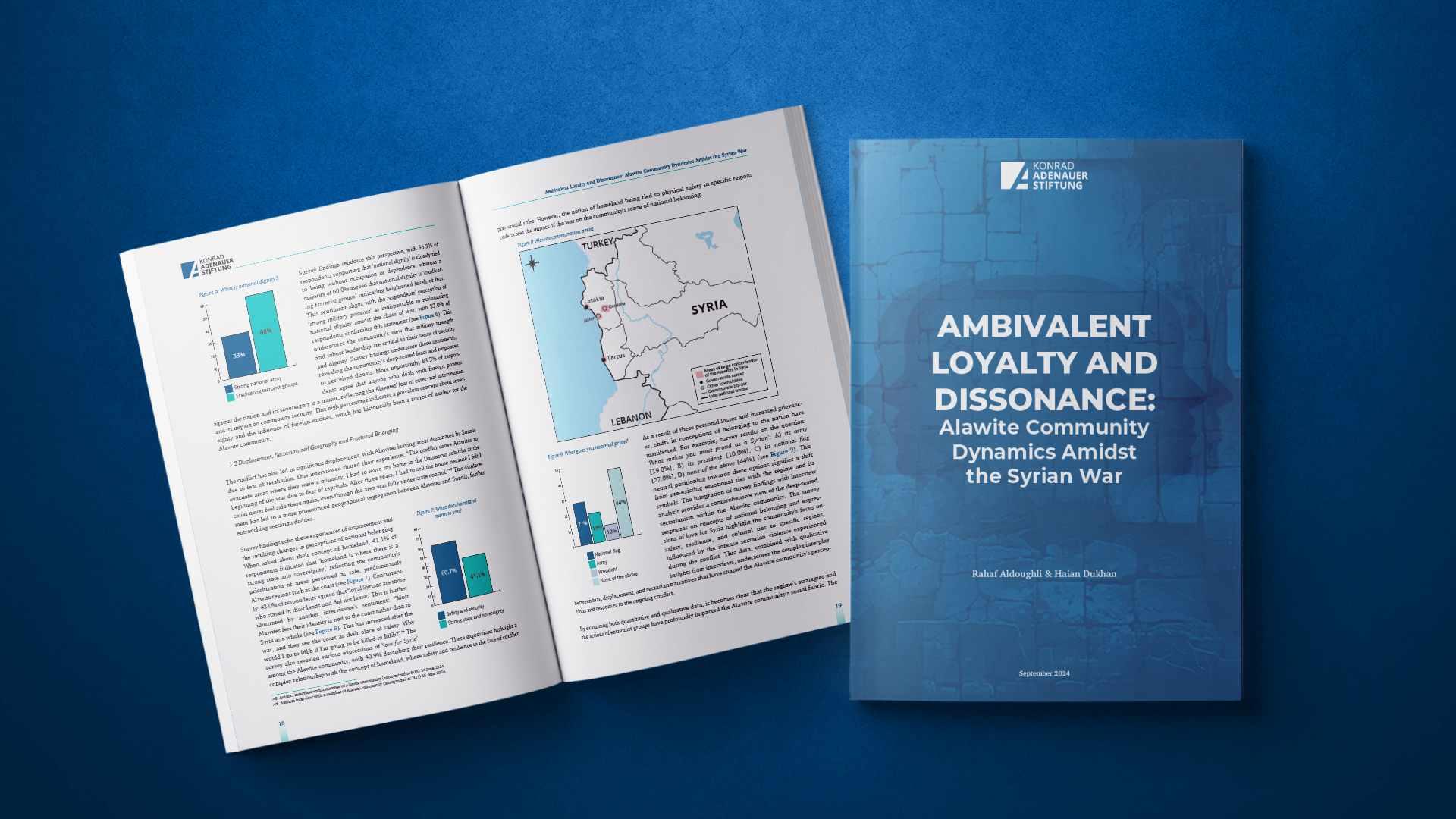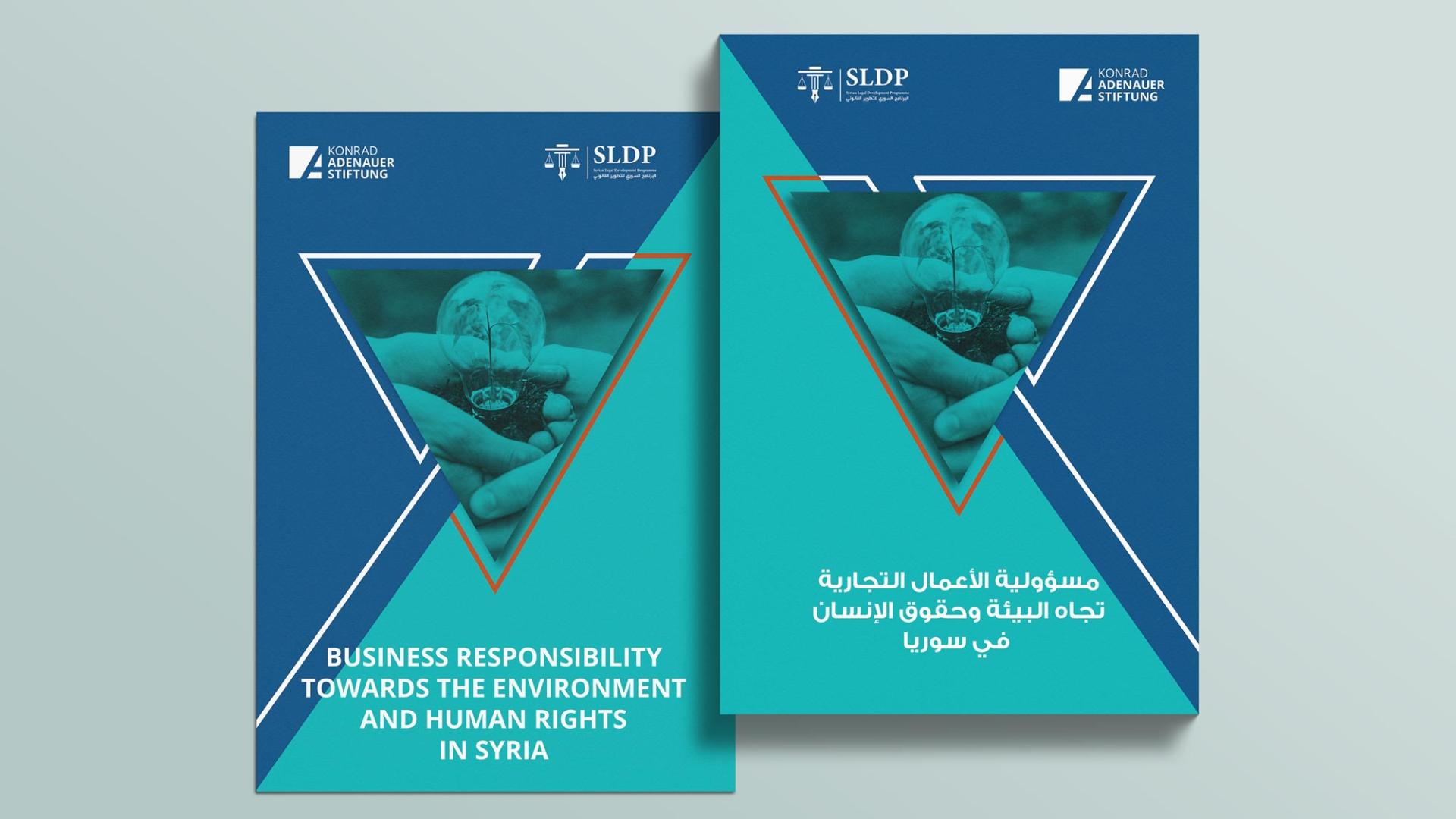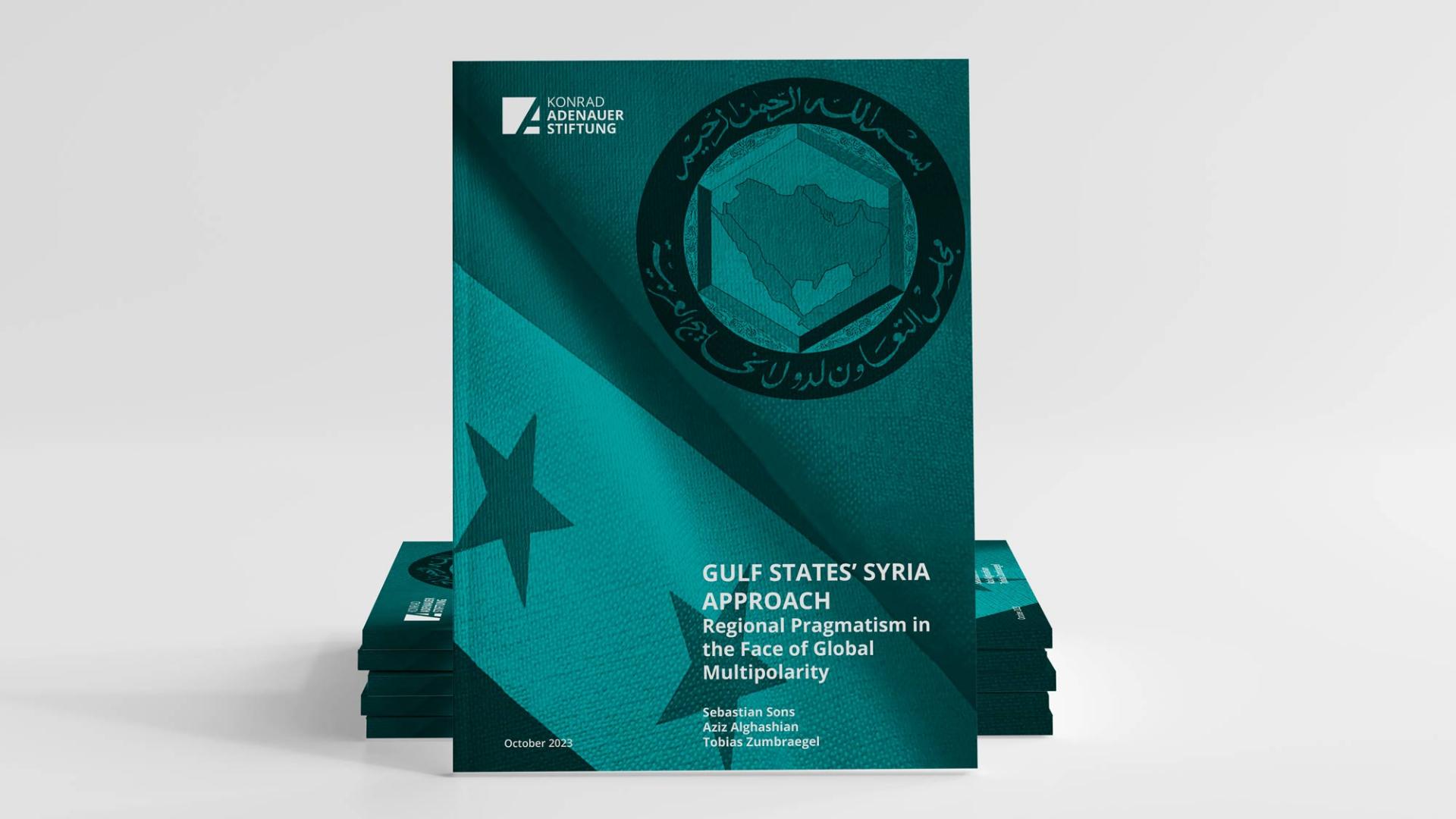Syria, once a cornerstone of the Middle East, has been left in turmoil following the outbreak of civil war in 2011. The nation is now politically and territorially fragmented, with large parts of the country lying in ruins and its economy shattered. Much of the Syrian society is divided and millions have been displaced inside and outside of Syria. Efforts to find lasting solutions toward peace and stability have repeatedly failed and, under the current conditions, it is difficult to envision how a path towards recovery will look like.
Despite — or exactly because of — these challenges, it remains crucial to gain a deepened understanding of the dynamics shaping the country today. These dynamics form a complex web of political, economic and social issues while also remaining deeply embedded in the country’s rich history, culture, and the lived experiences of Syrians, both in the past and present.
Through its work and publications, the Konrad-Adenauer-Stiftung’s (KAS) Lebanon Office, which also works on Syria under its regional mandate for issues of flight and migration, strives to offer different perspectives on these multifaceted issues. KAS aims to inform an interested readership and provide actionable policy recommendations for decision-makers and practitioners working on Syria.
Amongst others, the publications compiled on this webpage cover topics including the impact of the war on Syria’s various ethnic, religious and tribal communities, local governance in its different territories, issues of forced migration and internal displacement, economic and environmental concerns as well as interstate relations and regional issues concerning Syria.
Taken together, the studies offer a comprehensive view of the conflict and its ramifications, not only on Syria and Syrians but also on neighbouring countries and host communities that have been heavily impacted by the Syrian crisis.
Full collection of publications
Epochenbruch in Nahost? Zum Sturz des Assad-Regimes in Syrien
Epochenbruch in Nahost? Zum Sturz des Assad-Regimes in Syrien
Jahrzehntelang bestimmte das Assad-Regime die Geschicke Syriens – und am Ende kollabierte es innerhalb weniger Tage. „Für den Nahen Osten“, so schreibt der Spiegel, „ist das Ende der Assad-Diktatur ein epochales Ereignis“. Warum aber ist der Sturz des syrischen Autokraten potenziell so weitreichend für die gesamte Region? Und wie groß ist das Risiko, dass sich die Dinge in Syrien nicht zum Positiven wandeln, sondern das Land ins völlige Chaos abgleitet oder die eine autoritäre Herrschaft durch die nächste abgelöst wird? Das besprechen wir in dieser Folge mit dem Nahost-Experten Michael Bauer.
podigee
Syriens große Chance
Nach mehr als 50 Jahren endet die Herrschaft des Hauses Assad. Das ist ein Grund zum Feiern. Syrien steht jedoch vor großen Herausforderungen.
Der Sturz des Assad-Regimes erfolgte ebenso unvermittelt wie schnell. Die politische Neuordnung Syriens wird nach über 13 Jahren Bürgerkrieg und angesichts eines komplexen regionalen Umfelds jedoch nicht einfach. Eine heterogene Allianz teils dschihadistischer Rebellen muss den politischen Übergang gestalten und dabei die relevanten Stakeholder einbinden. Die Aufbruchsstimmung im Land ist groß, mischt sich jedoch mit Sorgen vor Racheakten und neuen Konflikten.
Klicken Sie hier, um die vollständige Veröffentlichung zu lesen.
Ambivalent Loyalty and Dissonance: Alawite Community Dynamics Amidst the Syrian War
How have historical marginalization, political manipulation, and socio-economic challenges reshaped the Alawites’ social identity, political affiliations, and perceptions? An in-depth analysis of the socio-economic and political transformations within the Alawite community in Syria.
Check out the full study here.
Territorial Fragmentation, Violence, and Local Governance in Syria’s Daraa Governorate
This study explores the factors driving violence and instability in Daraa, highlighting challenges in local governance and community resilience amidst ongoing conflict and economic hardship.
Check out the full study here.
Official and Black Market Exchange Rates in Syria, by Karam Shaar
Market Exchange Rates in Syria
An online interactive tool for tracking exchange rates in Syria
www.karamshaar.com
Navigating the Impact of Conflict on Syria’s Ethnic, Religious and Tribal Communities
How has the Syrian war impacted the country’s ethnic, religious and tribal communities and their efforts towards peace formation?
This report answers this question based on five critical case studies while highlighting constraints and opportunities towards localised solutions for peace formation in support of viable policy recommendations.
Check out the full report here.
Special Report: Refugees
A Special Report published by Executive Magazine in collaboration with the Konrad-Adenauer-Stiftung’s Lebanon Office.
Check out the full report here.
Business Responsibility Towards the Environment and Human Rights in Syria
A study conducted by The Syrian Legal Development Programme in collaboration with Konrad-Adenauer-Stiftung, Lebanon Office.
This study dives deep into the overlooked role of businesses, dissecting their environmental footprint and shedding light on the urgent need for sustainable practices.
Check out the full study here.
Was in Syrien geschieht
Das Syrien-Dossier der Konrad-Adenauer-Stiftung im zenith Magazin.
Gemeinsam mit dem Fachmagazin zenith beleuchtet die KAS in einem 46-seitigen Dossier in der Winter-Ausgabe 2023 die Entwicklungen rund um Syrien. Obwohl der Konflikt aus der Ferne den Anschein einer „eingefrorenen“ Situation erwecken mag und die Position von Assad stabil scheint, wird bei genauerer Betrachtung deutlich, dass das Land und seine Bewohner nach wie vor erheblichen Schwierigkeiten stehen. Dieses Dossier geht über eine oberflächliche Analyse hinaus und wirft einen tiefgehenden Blick auf die komplexen Dynamiken, die die Situation in und um Syrien maßgeblich beeinflussen.
Lesen Sie hier das vollständige Dossier.
Gulf States’ Syria Approach: Regional Pragmatism in the Face of Global Multipolarity
This paper analyzes the motivations (or lack thereof) of the Gulf monarchies to normalize relations with Syria. It focuses on underlying regional and international drivers for such a step and further sheds light on the respective Gulf monarchies and their specific positions on Syria.
Check out the full report here.
Regionale Normalisierung – Syrische Blickwinkel
Sowohl die Arabische Liga unter saudischer Führung als auch die Türkei haben Normalisierungsprozesse mit dem syrischen Regime ausgerufen: Während die arabische Annäherung im internationalen Kontext große Aufmerksamkeit erfährt, werden aus sicherheitspolitischen Gründen in Syrien selbst die türkischen Bemühungen genauer verfolgt. Eine erste Zwischenbilanz zeigt, dass keine der beiden Initiativen bislang Fortschritte erzielen konnte, da das Assad Regime keinerlei Zugeständnisse macht. Nichtstaatliche Akteure im Norden Syriens sind dennoch besorgt. Angesichts einer sich verschärfenden Wirtschaftskrise wächst zudem die Unruhe auch in Regimegebieten.
Um auf die vollständige Publikation zuzugreifen, klicken Sie hier.
The New Syrian Diaspora: From Basic Survival Struggles to Aspirations of Success and Integration
Against the backdrop of four different country-specific contexts, this report examines the asylum and integration experiences of Syrian refugees in Lebanon, Turkey, Germany and the U.S., shedding light on their challenges as well as societal and economic contributions.
Check out the full report here.
Shattered ground and shattered politics
A devastating earthquake struck Syria on February 6th. While thousands have lost their lives, political opportunism reigned supreme.
The developments that took place in Syria since the earthquake serve as a sad example how political motives frequently prevail over humanitarian ones. Especially the Assad regime has used the disaster to make political gains and strengthen its diplomatic channels.
Check out the full report here.
Syrian-Turkish Rapprochement
In light of recent steps towards rapprochement between Turkey and Syria after more than a decade of animosity, this study explores the consequences and questions related to the normalization of ties between the two countries. What repercussions might a rapprochement have for Syrian citizens, refugees and internally displaced as well as concerned non-state actors and foreign players? And how will it impact the overall humanitarian, economic and political situation in Syria?
Check out the full study here.















